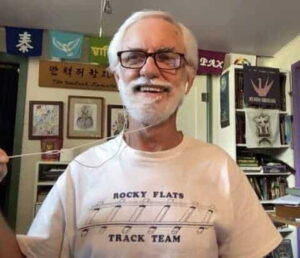 The Nuclear Resister has produced the following series of Nuclear Resister Stories for Nuclear Hotseat, a weekly podcast produced by Libbe HaLevy. In these 5-minute episodes, Jack Cohen-Joppa tells stories of actions for a nuclear-free future, culled from the archives of the Nuclear Resister newsletter.
The Nuclear Resister has produced the following series of Nuclear Resister Stories for Nuclear Hotseat, a weekly podcast produced by Libbe HaLevy. In these 5-minute episodes, Jack Cohen-Joppa tells stories of actions for a nuclear-free future, culled from the archives of the Nuclear Resister newsletter.
#1 The first nuclear resisters
#2 Fifty years ago, in a classic case of civil disobedience, a young anti-nuclear activist toppled a tower and blazed a trail through the courtroom that nuclear resisters have followed ever since.
#3 In a legendary anti-nuclear victory, British women came together at the Greenham Common Women’s Peace Camp, and succeeded in kicking U.S. nuclear missiles out of England.
#4 In 1980, the Plowshares Eight hammered on nuclear warhead nosecones and sparked a global movement of direct action for nuclear disarmament.
#5 Thirty-five years ago, rural communities in western New York took nonviolent direct action to Bump the Dump, stopping the state and the nuclear industry from trashing their countryside with “low-level” nuclear waste.
#6 Missouri is the “Show Me!” state, and the Missouri Peace Planters did just that when they repeatedly occupied multiple nuclear missile silos in the summer of 1988, causing a furor that helped raise awareness of this hidden danger at the height of the Cold War.
#7 There’s something about a train… and in the early 1980s, anti-nuclear activists from coast-to-coast turned that truth into a successful campaign that literally drove the bombs off the rails.
#8 In 1978, a late spring blizzard swept out of the Rocky Mountains and left behind a peace camp that occupied and repeatedly blocked the railroad tracks serving the Rocky Flats nuclear weapons plant.
#9 Eighty years after the atomic bombings of Hiroshima and Nagasaki, here’s a look back to the 40th anniversary in 1985, and some of the creative, widespread nonviolent action that galvanized the movement for a nuclear free future at the height of the Cold War.